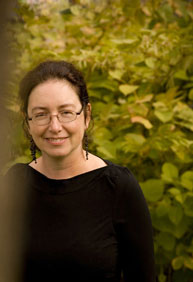Coming full circle
Pilot program promotes acceptance
Since opening its doors earlier this year, the Social Equity and Diversity Education Office (SEDE) has been far from idle. The team led by Veronica Amberg has put heart and imagination into programming for an audience that's eclectic to say the least. "The message of equity and diversity is consistent and the issues are the same but within the McGill community there are very different audiences, different interests and different ways of learning," Amberg explains.

Veronica Amberg and the Social Equity and Diversity Office aim to bring positive change to all segments of campus life.
Claudio Calligaris
One of the initiatives that brings these different groups together is the recently launched Learning Circles, a pilot project in diversity and equity education. Students, staff and faculty attend a series of four 90-minute sessions that cover a broad range of topics, including ethnicity, gender, sexual orientation, social class and more.
"We start with a gentle approach," says Liz Meyers, the PhD student who organizes the Learning Circles for SEDE. "We usually have a warm-up activity to get people talking about the theme. Then an expert or community member gives a presentation; for instance, one was on myths and facts about First Nations people. We wrap up with an open discussion to try to connect different themes and look at how these issues tie in to McGill. We always try to bring it back to McGill."
The Learning Circles program is just one of a string of SEDE successes. As part of the Cultivate Respect campaign for harassment prevention week in October, the group put on an interactive lunchtime play called You Decide! Audience members gave their input as to when conduct crossed the line into harassment by holding up large coloured squares — a sort of Gong Show for bad behaviour. "We were overwhelmed by the response we got," Amberg says. "People were so positive and they really appreciated the interactive nature of the play."
SEDE has plans underway for Diversity Week in March 2007 and the launch of the Expressions of Diversity website, which will feature poems, insights and whatever McGill community members want to contribute on the theme of diversity and equity.
Amberg is very much encouraged by the response to SEDE. "We're happy about what has developed in the last six or seven months and it's because of people's support that we are able to get important messages out," Amberg says. "When you work together and share experiences, the results tend to be positive."

